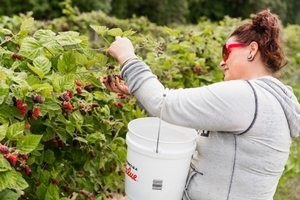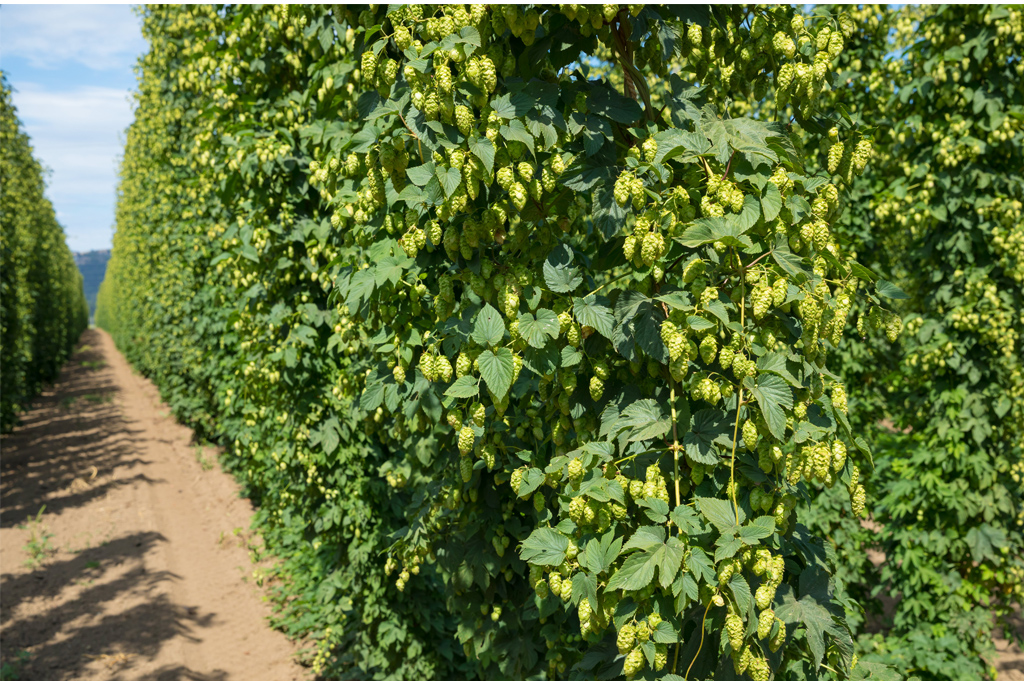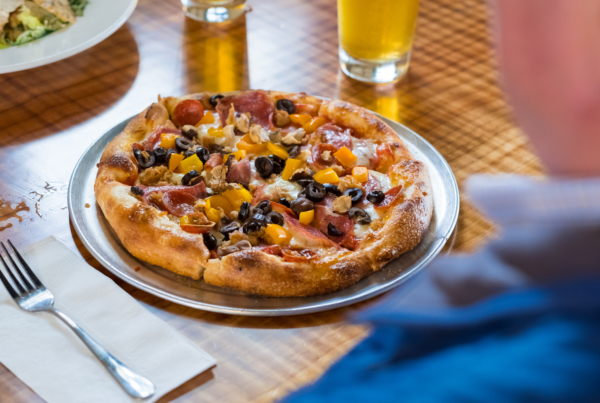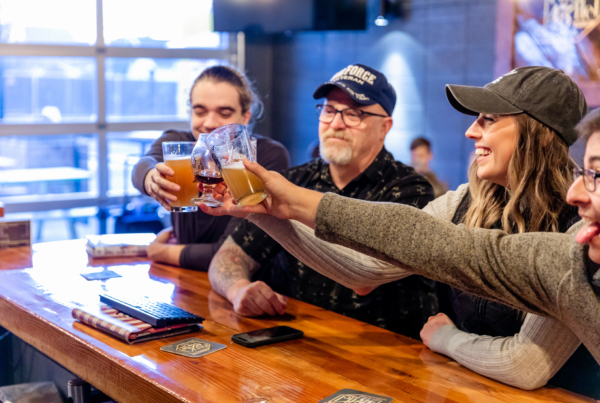Locally made goods from the Mid-Willamette Valley
Salem and the Willamette Valley have been synonymous with fertile farmland for thousands of years. Native Americans harvested fields near downtown for centuries, and the young city held a festival celebrating the cherry harvest as far back as 1903.
Today, a new generation of “makers” is redefining our relationship with the Willamette Valley. And they’re doing it in ways that allow visitors to experience (and occasionally taste) the region’s rich bounty firsthand—by opening honey tasting rooms, offering tours of hop farms and pumpkin patches, and even selling handcrafted soap sold from a historic theater.
Here’s a look at five local businesses producing homegrown and handmade goods that showcase the best of Salem, Marion and Polk counties, and the wider Willamette Valley.

Flying Bee Ranch
You can hardly throw a marionberry in the Willamette Valley without hitting a brewery, winery, or distillery tasting room these days. But what if you could visit a tasting room specializing in, of all things, honey?
Family-owned since 1999, Flying Bee Ranch boasts roughly 500 colonies and offers a wide variety of local, raw honey—and visitors can try more than a dozen specialty varieties at the company’s tasting room just outside of Salem. Some of Flying Bee’s most popular varieties incorporate coriander, pumpkin, orange blossom, maple, and wildflowers like ginger, yarrow, daisies, and more.
In addition to the free tastings, visitors can purchase other products from the hive, including pollen, propolis, beeswax, and honey comb. Hungry yet? Honey tastings are available to the public from 9 a.m. to 5 p.m. Tuesday through Saturday.
Willamette Valley Pie Company
If you’ve slurped a raspberry milkshake, eaten a slice of blueberry pie, or indulged in a bowl of strawberry ice cream recently, there’s a decent chance those succulent berries went through Willamette Valley Pie Company. After all, the local outfit processes, on average, 12 million pounds of fresh, locally grown fruits every summer—including strawberries, raspberries, boysenberries, blueberries, blackberries, cranberries, and (of course) marionberries.
The company’s ascent started in 1999, when it was known as Willamette Valley Fruit Company; at the time, the family-owned fruit processor worked with local growers to supply manufacturers and culinary companies with regional fruit.
Then, in 2001, one of the company’s clients—LaSuisse Specialty Foods—went up for sale. Wanting to get into the pie-making business, Willamette Valley Fruit Company purchased LaSuisse and later rebranded as Willamette Valley Pie Company.
Today, the company has expanded operations considerably and ships its products all over the United States—but still prides itself on working with local growers to showcase the best of the Willamette Valley. “We have a very family-oriented, down-to-earth culture here where we take more pride in who we are than the dollars we make,” says CEO Jeff Dunn.
Want to try that pie for yourself? Willamette Valley Pie Company desserts are available at grocery stores, farm stands, and restaurants throughout Oregon—but a stop at the company’s local store and cafe is not to be missed. The Salem-area store offers pie by the slice, fresh baked goods (like muffins and scones), pick-your-own blueberries each summer, and more.
Rogue Farms
Rogue Ales puts the “craft” in “craft beer”—and nowhere is that clearer than at the brewery’s farm just outside of Independence.
Rogue Farms grows four varieties of hops, all used in the brewery’s ales and lagers; honey is harvested on the farm—and used in Rogue’s Honey Kölsch; homegrown herbs and cucumbers go into every batch of its award-winning Rogue Spruce Gin; farm-grown pumpkins are roasted onsite and used in Rogue’s annual Pumpkin Patch Ale; and marionberries get split among Rogue’s marionberry sour ale and soda.
General Manager Ally Ward explains that it’s all part of a commitment to creating a sense of place at Chatoe Rogue, the on-site tasting room. “We’re giving an experience where you’re drinking beer that has ingredients that were grown several feet from you,” she says. “Nowhere are you going to see an operational hop farm and learn, from ground to glass, what that process is like.”
Those ideals extend to the kitchen, where Rogue uses farm-grown ingredients and fare from local institutions (like sausage from Carlton Farms and baked goods from nearby Ovenbird Bakery) to craft fresh (and seasonal) menu items.
Interested in seeing for yourself? Rogue Farms is open spring, summer, and early fall; between Memorial Day and Labor Day weekends, visitors can take farm tours at 1 p.m. and 3 p.m. every Saturday and Sunday.
Divine Distillers
When husband-and-wife team Jason Greenwood and Jennell Ives launched Divine Distillers in 2018, the duo did so with a dream and a 26-gallon still. The distillery—Salem’s first—was a hit from day one, and just two years later, Greenwood anticipates increasing capacity to where Divine can distill upwards of 1,000 gallons per day by the summer of 2020. “We can’t make enough product for the demand,” Greenwood admits.
In a way, it’s a good problem to have: Customers clearly love the Divine lineup, which includes an agave spirit, brandy, eau-de-vie, and rum.
Greenwood chalks some of that popularity up to Divine’s passion for reflecting the region that berthed the distillery: “It was very important for us to be true to who we are and where we are—and source as much as possible locally,” he says. “It’s nice to be able to connect to the local farmers and the local community.”
Since opening, Divine has distilled, among other fruits, peaches, plums, apples, blackberries, and cherries grown in the Willamette Valley.
And, when fruits are in-season, Divine makes that connection real with eau-de-vie pairings that invite visitors to sip their way through the entire farm-to-bottle production cycle. As Greenwood explains it, visitors can try a locally grown strawberry, sip a wine made with local strawberries, and then try the brandy made from that wine. He calls it a “vertical flight” of the fruit and has offered similar pairings with peaches and pears. “We hope people get an appreciation for how the fruit goes through the entire process, and how we try to stay true to that particular fruit,” Greenwood says.
Note: The Divine Distillers tasting room is currently closed and relocating to South Salem. Greenwood hopes to open in the new location by spring 2020; keep an eye on the Divine Distillers website for news and updates.
SLAB Handcrafted Soap Company
When most of us think about sustainable practices and locally sourced ingredients, we instinctively imagine food and drink; just in this piece alone, for instance, we’ve covered everything from honey to spirits.
But for more than a decade, SLAB Handcrafted Soap Company has been taking an all-new approach to soap in the heart of the Willamette Valley.
SLAB starts with a formula that leans on locally sourced palm, coconut, and olive oil; those oils are then mixed by hand, poured, and cut onsite and prepared for sale in 100% plastic-free packaging. In all, SLAB’s handcrafted lineup includes a mixture of exfoliating, essential oil, and unscented soaps—with ingredients that range from avocado butter to activated charcoal.
And that commitment to sustainability is just part of the charm at SLAB. The company’s downtown location is in Reed Opera House; built in 1870, the historic opera house is Oregon’s oldest surviving theater—and, in addition to SLAB, hosts a variety of stores, shops, bakeries, bars, and more.




